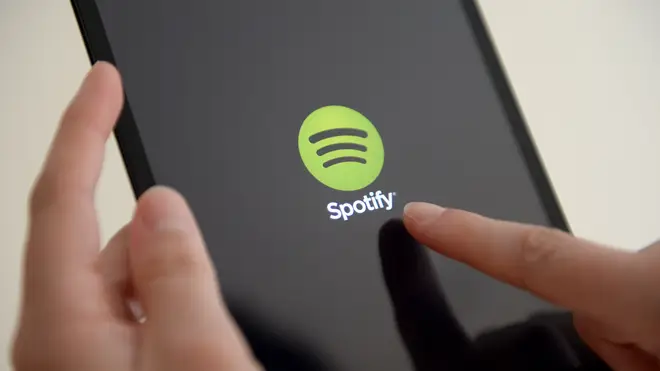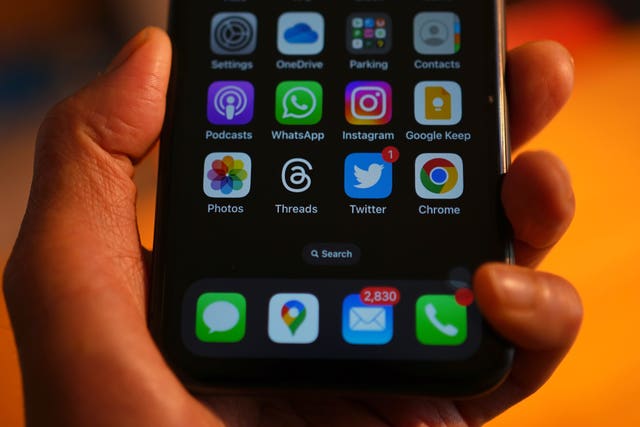
Clive Bull 1am - 4am
1 March 2024, 16:24

The music streaming giant has accused the iPhone maker of not complying with the EU’s Digital Markets Act.
Spotify has accused Apple of trying to “scare everybody about privacy and security” over its complaints about complying with new EU competition laws.
The music streaming platform’s global director of competition policy said Apple’s warnings about having to make the iPhone less secure in order to comply with the Digital Markets Act (DMA) equated to the saying “the only way to have privacy and security is to allow a monopolist to continue to abuse monopoly power”.
Avery Gardiner also claimed Apple’s new system does not comply with the DMA as it requires developers to sign up to new business terms and pay new developer fees in order to use alternative app stores and payment systems.
The DMA, which comes fully into force later this month, requires the biggest tech platforms to give consumers more choice, and in Apple’s case means allowing users to download apps onto their device from outside the App Store for the first time, as well as allowing alternative payment methods in the store.

On Friday, Apple published details on how it plans to do this, and new security features it was putting in place to prevent malicious apps from reaching iPhone handsets as the platform opened up, but warned it could not eliminate the risk entirely under this new system for EU users.
But Ms Gardiner, Spotify’s competition policy lead, said the notion that security and privacy could only come from Apple’s own App Store was “just not true”.
“If Apple were the only way to keep things private and secure, why haven’t Android users left Android in droves for Apple over concerns about privacy and security? They haven’t,” she told the PA news agency.
“This has been their tactic globally – scare everybody about privacy and security.
“Tell them that the only way to have privacy and security is to allow a monopolist to continue to abuse monopoly power. I understand why they’re doing it, but it’s not truthful.”
Ms Gardiner also criticised the iPhone maker over its proposed new business terms for developers as part of its DMA changes, which developers can opt not to sign up to, but would be unable to use the alternate app stores or payment method tools as a result.
According to Apple’s own documents, although the new terms will see developers pay a reduced commission of either 10 or 17% – down from between 15 and 30% – there will be an additional 3% “payment processing fee” to use Apple’s payment system.
A new “core technology fee” will also be in place which will charge developers 0.50 euros for each new user per year over the one million user threshold.
The tech giant says with the choice of existing or new business terms, 99% of EU developers would reduce or maintain the fees they owe Apple, and less than 1% would pay the core technology fee.
But Ms Gardiner said Apple’s approach did not comply with the DMA, and suggested the European Commission could launch a new investigation into the tech giant under the new rules.
“Apple has announced a set of proposed rules that do not comply with the DMA,” she said.
“At the most basic level, the idea that you have to opt in to an onerous new fee structure in order to avail yourselves of the rights granted to you by the European Parliament is bizarre.
“The DMA is really clear: App stores have to let developers communicate offers free of charge. Those are the words. It doesn’t say ‘as long as you opt into an onerous new fee structure that would impose a massive tax on you’.
“It is on its face, not compliant with the DMA, and the commission is going to need to open an investigation unless Apple changes its tune.”
She added that the fees were a “very clever design” to “evade the entire purpose of the DMA” by incentivising developers to not sign up to the new system which would enable alternative app store use.
“And that means that alternative app stores will never achieve the scale that they would need to be commercially viable, because most of the large free apps would face an impossible financial penalty if they opted in,” she said.
“So that means that those alternative app stores will never reach scale, and never impose the competitive pressure on the (Apple) App Store that the DMA is designed to facilitate, so it’s a clever way to frustrate the very purpose of the DMA, and I think the commission is going to see it for what it is.”